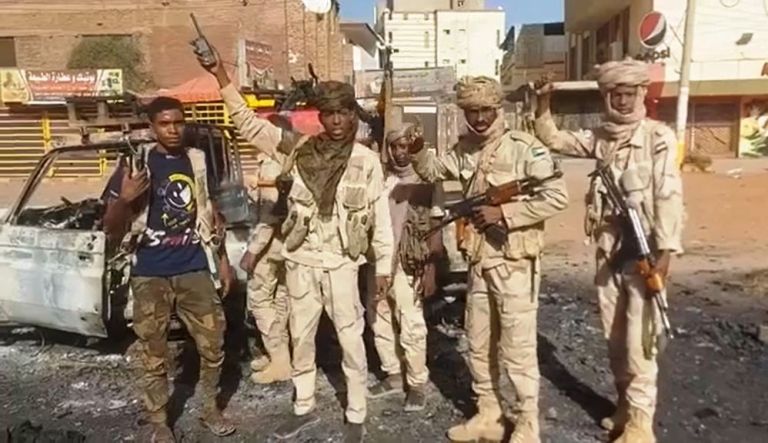Women’s Network condemns wartime atrocities in South Kordofan

RSF fighters announcing they destructed a force of the Sudanese army in El-Geneina on April 22, 2023
March 23, 2024 (NAIROBI) – The Horn of Africa Women’s Network (SIHA) is raising alarm over the systematic use of sexual violence and kidnapping against women in Sudan’s ongoing conflict. The network accuses the Rapid Support Forces (RSF) of employing these tactics as weapons of war and recruitment incentives.
SIHA has documented a series of violations in South Kordofan and the Nuba Mountains region. The network alleges the RSF is systematically targeting these areas, aiming to displace and eliminate farming communities.
Hala Al-Karib, SIHA’s regional director, reveals disturbing patterns. She claims the RSF has used the kidnapping of girls and forced marriage of minors as strategies for the past two decades. This has reportedly intensified due to a culture of silence among both military and civilian leadership, as well as lenient policies towards rape crimes.
Al-Karib emphasizes the devastating impact on Sudanese women. The collusion of warring parties and the lack of legal and security reforms have left women vulnerable to the chaos of the armed forces.
A recent SIHA report, titled “South Kordofan and the Nuba Mountains: Rapid Support Militia Continues to Commit Atrocities,” details specific incidents. It alleges RSF attacks in December 2023 on villages in South Kordofan, resulting in deaths, kidnappings, and the displacement of nearly 9,000 people. Another attack in February 2024 reportedly killed seven young men and abducted thirteen girls.
The SIHA report, citing local activists, reveals the kidnapped girls were taken to Al Quoz, a locality controlled by the RSF. Three women have reportedly been released, but the fate of the remaining girls remains unknown.
The regional network draws parallels between these abductions and past practices under the Bashir regime. It criticizes the empowerment of tribal militias, which eventually became the RSF, and their history of violence.
The report highlights a critical consequence of the conflict – the collapse of the healthcare system. This leaves women and girls, especially those who have suffered sexual violence, without access to essential reproductive and public health services, further deepening their suffering.
Since early February, South Kordofan and the Nuba Mountains have been experiencing a communications and internet blackout. This has made documenting violations, delivering aid, and providing services extremely difficult, hindering efforts to help affected women and communities.
The report strongly criticizes the international community, civil society, and political forces for neglecting the issue of violence against women, particularly sexual violence. It emphasizes that continued silence and failure to hold perpetrators accountable will only perpetuate the cycle of violence and further erode Sudan’s social fabric.
The report concludes with a powerful message: achieving peace necessitates punishing perpetrators. This clear call to action demands international pressure and domestic legal action to ensure accountability and prevent future atrocities.
(ST)
